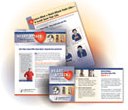Clinical Trials
The National Heart, Lung, and Blood Institute (NHLBI) is strongly committed to supporting research aimed at preventing and treating heart, lung, and blood diseases and conditions and sleep disorders.
NHLBI-supported research has led to many advances in medical knowledge and care. For example, this research has helped look for better ways to treat heart problems using methods such as coronary angioplasty.
The NHLBI continues to support research on coronary angioplasty. For example, NHLBI-sponsored research includes studies that:
- Compare coronary artery bypass grafting (CABG) with angioplasty and stenting in patients who have diabetes and blockages in more than one coronary artery
- Collect and assess medical information from patients who have had angioplasty or a combination of surgery and angioplasty to open clogged coronary arteries
- Compare two treatment strategies for people who have ischemic heart disease to determine which is better
Much of this research depends on the willingness of volunteers to take part in clinical trials. Clinical trials test new ways to prevent, diagnose, or treat various diseases and conditions.
For example, new treatments for a disease or condition (such as medicines, medical devices, surgeries, or procedures) are tested in volunteers who have the illness. Testing shows whether a treatment is safe and effective in humans before it is made available for widespread use.
By taking part in a clinical trial, you can gain access to new treatments before they're widely available. You also will have the support of a team of health care providers, who will likely monitor your health closely. Even if you don't directly benefit from the results of a clinical trial, the information gathered can help others and add to scientific knowledge.
If you volunteer for a clinical trial, the research will be explained to you in detail. You'll learn about treatments and tests you may receive, and the benefits and risks they may pose. You'll also be given a chance to ask questions about the research. This process is called informed consent.
If you agree to take part in the trial, you'll be asked to sign an informed consent form. This form is not a contract. You have the right to withdraw from a study at any time, for any reason. Also, you have the right to learn about new risks or findings that emerge during the trial.
For more information about clinical trials related to angioplasty, talk with your doctor. You also can visit the following Web sites to learn more about clinical research and to search for clinical trials:
- http://clinicalresearch.nih.gov
- www.clinicaltrials.gov
- www.nhlbi.nih.gov/studies/index.htm
- www.researchmatch.org
Clinical trials are research studies that explore whether a medical strategy, treatment, or device is safe and effective for humans. To find clinical trials that are currently underway for Coronary Angioplasty, visit www.clinicaltrials.gov.
November 14, 2011
Delayed stem cell therapy following heart attack is safe but not effective
Stem cells obtained from bone marrow, known as BMCs, can be safely injected into people 2-3 weeks following a heart attack, reports a new clinical trial supported by the National, Heart, Lung, and Blood Institute (NHLBI), part of the National Institutes of Health. However, while safe, the BMCs did not improve heart function six months after their administration.

When a heart attack happens, any delays in treatment can be deadly.
Knowing the warning symptoms of a heart attack and how to take action can save your life or someone else’s.
The NHLBI has created a new series of informative, easy-to-read heart attack materials to help the public better understand the facts about heart attacks and how to act fast to save a life.
Click the links to download or order the NHLBI's new heart attack materials:
“Don’t Take a Chance With a Heart Attack: Know the Facts and Act Fast” (also available in Spanish)
“Heart Attack: Know the Symptoms. Take Action.”
“Learn What a Heart Attack Feels Like—It Could Save Your Life”
The NHLBI updates Health Topics articles on a biennial cycle based on a thorough review of research findings and new literature. The articles also are updated as needed if important new research is published. The date on each Health Topics article reflects when the content was originally posted or last revised.
















